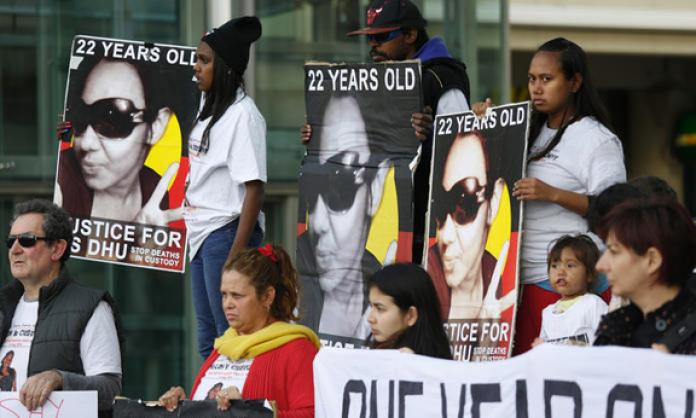A crowd of family members and supporters gathered on the steps of Perth’s central law courts on the second anniversary of the death of 22-year-old Aboriginal woman Ms Dhu. They demanded that the West Australian coroner release CCTV footage of the hours leading up to Ms Dhu’s death in police custody. “CCTV – for the family!” was the chant raised by the protesters.
The coronial inquest, which began more than a year after Ms Dhu’s death, continues. Evidence so far has been harrowing. The inquest has heard that Ms Dhu – arrested for non-payment of fines – arrived in police custody at the South Hedland station, already in pain from two broken ribs that had been inflicted by acts of domestic violence.
Despite repeatedly complaining, the infection that ultimately killed her was never treated seriously. She was twice taken to the local hospital, and twice sent back after police told health staff that she was “faking it”. On Ms Dhu’s third and last visit to hospital, she was diagnosed with severe staphylococcal septicaemia, from which she never recovered.
CCTV footage of her ordeal, played during the inquest, is now being suppressed by the coroner. Despite the graphic and painful nature of the footage, Ms Dhu’s family has made a submission to the coroner asking that it be made public in order to expose the truth about Aboriginal deaths in custody.
The coroner, Ros Fogliani, has justified the suppression of the footage by citing concern that it could “re-traumatise” family members. Shaun Harris, Ms Dhu’s uncle, told Red Flag that “suppressing the footage against the family’s wishes is in itself re-traumatising”. He said that “the footage shows the deeply ingrained and institutional racism that exists in Australia”.
Ms Dhu’s case is not isolated. Only two days before the anniversary of her death, the ABC reported that two 14-year-old Aboriginal boys had lodged an official complaint with WA police that officers had held guns to their heads while they were being detained. The boys were also taken to the South Hedland police station, where they were strip-searched and made to spend the night in lockup.
According to the WA Refugee Rights Action Network, refugees on Nauru have compared the treatment experienced by Indigenous people in police custody to their own horrific conditions, sending messages of solidarity to the family of Ms Dhu. While Ms Dhu’s family and supporters gathered in Perth, refugees at the Nauru detention centre held signs saying, “We Stand With Aboriginal Australia”.




